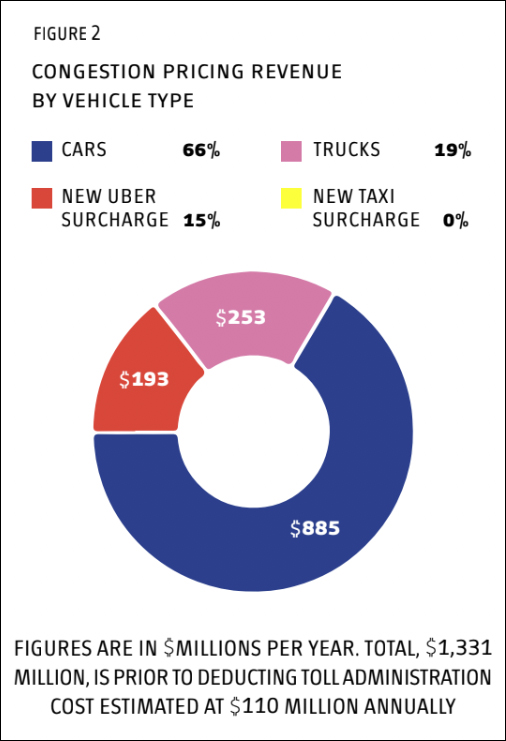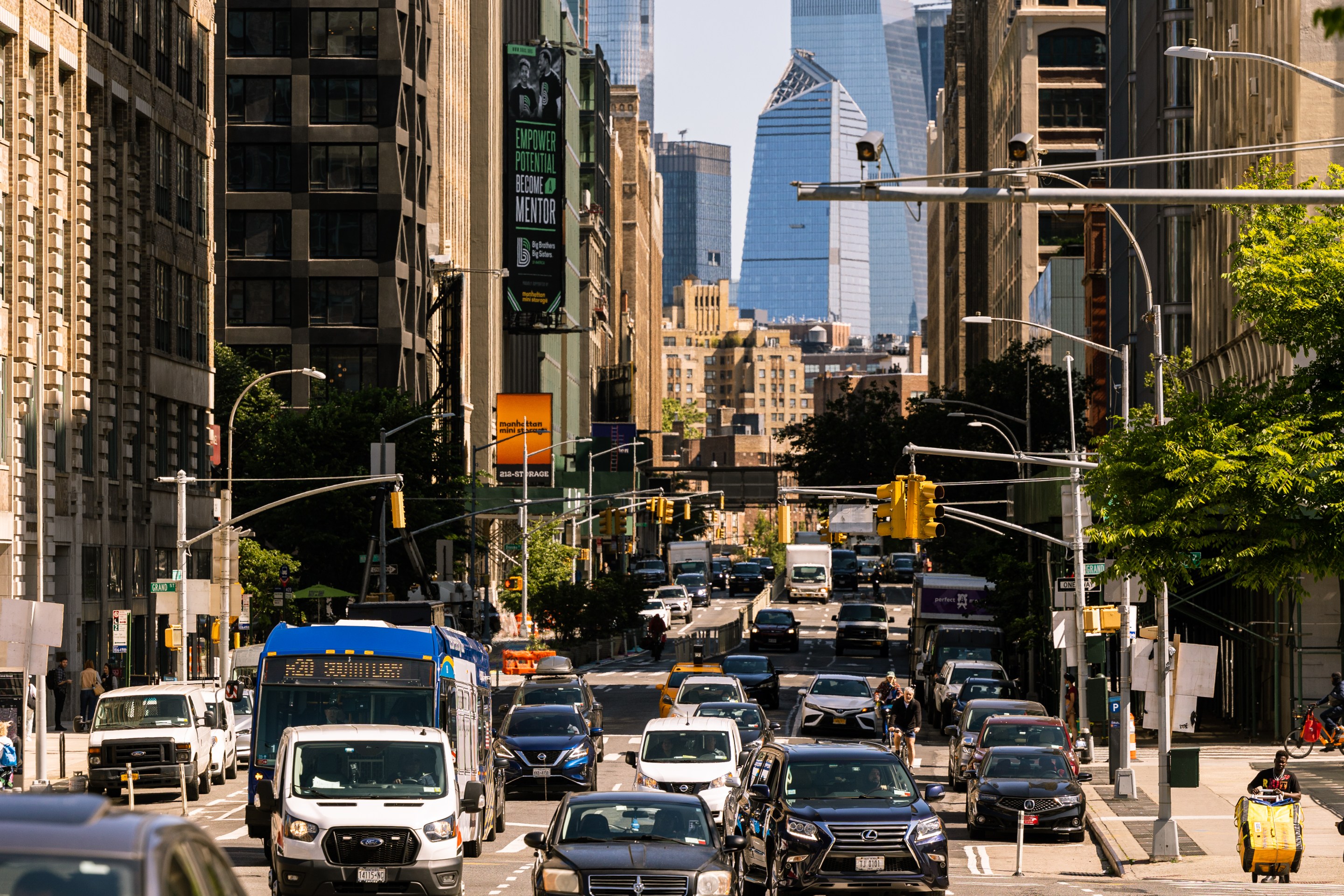A $15 peak-hour, $9 weekend, and $3 off-peak toll combination could be the sweet spot for the MTA's congestion pricing plan, according to the man whose traffic models shaped the 2019 legislation that put the plan in place.
The three-tiered pricing scheme would cut weekday traffic 14 percent while bringing in $1.2 billion per year for the MTA, longtime congestion pricing scholar Charles Komanoff wrote in a new paper co-authored with fellow economist Gernot Wagner and released Monday ahead of the inaugural meeting of the panel tasked with recommending the toll amounts.
A $15 peak toll to enter the Central Business District would be more politically palatable than the $23 maximum fee floated in the MTA's official environmental review of the program, Komanoff and Wagner said. This "modest political sweet spot" would see car and truck drivers south of 60th Street in Manhattan pay:
- $15 per trip between 6 a.m. and 8 p.m. on weekdays,
- $9 per trip from noon to 10 p.m. on weekends and holidays,
- and $3 per trip from 8 p.m. to 6 a.m. on weekdays and 10 p.m. to noon on weekend.
Taxis and Ubers would not be charged under the Central Business District tolling program under Komanoff and Wagner's plan. Instead, an existing charge on app-based ride hails south of 96th Street would increase from $2.75 to $5.
Drivers who enter Manhattan via tunnel, meanwhile, should receive rebates on their congestion fees, the authors said — but drivers who come via the GW or RFK Bridges should not, since those bridges sit several miles from the toll zone.
The Komanoff/Wagner plan doesn't conform to any of the scenarios that the MTA modeled for the federal government in its environmental assessment, but seeks to charge drivers based on the impact of their trips on traffic — hence the lower toll at night when traffic is negligible, the pair said.
"The off-peak toll rate of $3 matches, with rounding, the $2.90 subway and bus fares that the MTA is expected to ratify this summer," the economists wrote in their 21-page report titled "A New York Congestion Toll to Live With."
"The relative toll rates are in rough proportion to the congestion each additional car trip causes, though, we hasten to add, much below their absolute congestion costs."
The six-person Traffic Mobility Review Board tasked with recommending the toll prices and exemptions to the MTA Board meets for the first time on Wednesday afternoon. The MTA received a raft of exemption requests during the environmental review process; they should all be rejected, Komanoff and Wagner said — or else they threaten the program's effectiveness. Each additional exemption requires a higher toll for everyone who isn't exempt — since the MTA is mandated by law to raise $1 billion each year from the program, which requires approximately $100 million in annual operating costs.
Rebates for crossings, within reason
Drivers who come in to Manhattan via the Lincoln Tunnel and Holland Tunnel, — tolled by the Port Authority — or via the Queens Midtown Tunnel and Brooklyn Battery Tunnel — tolled by the MTA — should all receive credits for those tolls, the report said.

All four tunnels deposit drivers directly into the congestion zone — effectively double tolling drivers who already pay up to $14.75 to the Port Authority or $6.55 to the MTA.
But drivers coming over the George Washington Bridge and the Robert F. Kennedy Triborough Bridge should not receive credit for the congestion zone fee, Komanoff and Wagner said — distinguishing their position from that of groups including the Regional Plan Association, which has argued in favor of crediting the bridges to cut down on drivers "shopping" for the cheapest way into the city.
"We worry without credits at RFK, people will be encouraged to use local streets in the Bronx and upper Manhattan," said Regional Plan Association Executive Vice President Kate Slevin. "Without appropriate credits at the GW, people will drive down to the Lincoln Tunnel or Holland Tunnel, causing more traffic in Jersey City and Hoboken, and Hells Kitchen or Chelsea."
"It’s a fine balance because the MTA has to reach a revenue goal, and meeting that goals is absolutely necessary, and every credit provided means others tolls will increase. But without credits, the agency is missing a chance to reduce unnecessary driving and congestion in neighborhoods around the cheaper crossings."
Komanoff and Wagner's argument rests on the idea that since the northern crossings are so far from the start of the congestion cordon (six miles in the case of the GWB, and five miles in the case of the Triborough), drivers who drive south of 60th Street via those bridges impose costs in the form of traffic, emissions and crashes that outweigh the amount they would pay in tolls.
"The further out from which one drives into the congestion zone, the more ambiguous 'double tolling' becomes and the more the toll credit whitewashes the externality costs of the miles driven from the upstream toll crossing to the congestion zone boundary," Komanoff and Wagner wrote.
The tunnels-only rebate has the support of another "father" of congestion pricing — former NYC Traffic Commissioner Sam Schwartz, who told Streetsblog that a credit for drivers who use the RFK Bridge could add emissions and traffic to the South Bronx, something the MTA has promised to avoid. Furthermore, toll credits over the uptown crossings would likely give a discount to suburbanites who are well-off enough to pay the toll, he said.
"If you're a driver coming from Greenwich, Connecticut — instead of taking the Whitestone Bridge, where you don't get a toll credit, and coming into the city via the Long Island Expressway and Queens Midtown Tunnel, you would shift to the RFK Bridge. That means taking the Bruckner Expressway to the bridge, and therefore adds traffic to the south Bronx," Schwartz said.
"You're saying if someone comes from Alpine, New Jersey, one of the highest income areas in region, that person should get a break, but not the person who comes from Washington Heights? It doesn't seem to make sense to me."
To wit, suburban drivers won't actually be paying the largest share of the tolls, according to Komanoff and Wagner's analysis. That distinction belongs to New York City residents: Queens, Brooklyn and Manhattan will contribute the most, in that order, followed by the entire state of New Jersey, then the rest of the region.
According to Komanoff and Wagner, "Of every dollar coughed up by motorists in congestion tolls and surcharges, city residents will pay 61 cents."
In fact, if drivers were to pay the true cost of traffic congestion — things like time lost to sitting in traffic, emissions and noise pollution — the toll would be triple the rate the authors proposed, they said.
"Far from seeking to “soak drivers” in pursuit of some mathematical holy grail, our plan aims for a more modest political sweet spot," their report concluded.
"If change is hard, dramatic change all at once is even more difficult. Getting a midrange congestion pricing program in place is significantly better for New York than propounding a theoretically perfect plan that never leaves the shelf."






